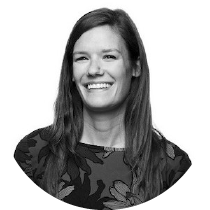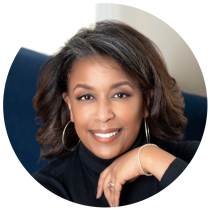International Women’s Day (IWD) is a global day celebrating the social, economic, cultural, and political achievements of women. The day also marks a call to action for accelerating women's equality.
Observed for well over a century, the first IWD gathering in 1911 supported by over a million people. Today, IWD belongs to all groups collectively everywhere. IWD is not country, group, or organization specific. The theme for this year is #EmbraceEquity, which seeks to get the world talking about why "equal opportunities are no longer enough."
In honor of International Women’s Day, BlueConic is featuring five inspiring women leaders within our organization and across our customer base. These incredible women share their insight on their role models, how they got to where they are today, and what they believe we can all do to inspire future female leaders.
Katherine Boardman, Chief People Officer, BlueConic

Q: How did you get to where you are today?
A: Growing up I wasn't aware of barriers. My parents and family assumed I would follow my heart, explore interests. Looking back, the fact that there weren't limitations expressed towards me allowed me to imagine any vocation.
Q: What does a typical day look like for you?
A: I've committed to starting the day with ten minutes of silent meditation. Sitting still before the day winds up has been such a helpful tool and I can tell the difference if I don't start the day that way. At BlueConic, days are a mix of reflecting on and learning from what we've succeeded and failed at, focusing on the issues at hand while moving initiatives forward, and then spending some amount of time each day imaging the future and trying to look around the corner to anticipate both the opportunities we want to grab as well as anything that might be a barrier to achieving our goals.
On a good typical day, I'm also spending time on my yoga mat, connecting with a friend - even if it's with a few texts back and forth. Staying committed to ensuring there's some movement and connection is an absolute priority.
Q: What has been the most significant barrier?
A: One of the greatest is around figuring out, for those who may have decide to have children or who have obligations for caring for family members, how do we 'do it all'. Men don't have to apply that filter. I believe women still have to make choices about family or career or family than slower moving career. Early in my career I worked at organizations which were less progressive than those I've been part of in the second half of my career. Having been part of cultures for that didn't have as many women leaders helped raise my awareness of the importance of recreating structures and environments that celebrate and deliberately promote women and set goals to increase women in leadership positions.
Q: How do you promote and nurture women at work?
A: To see each woman as an individual. In mentoring and coaching women, I have conversations with them about how they can solve their own puzzle around prioritizing all that's on their plate. Helping solve for today while looking out over the horizon and dreaming. Break seemingly big problems into pieces. When things are overwhelming, write down each task, to do, problem on a post-it or index card and spread them out on the floor. Put the less important ones to the side and then focus on what's left. Get it out of your head.
Q: What's your advice for aspiring women leaders?
A: Ask lots of questions, connect with supportive and knowledgeable women and men. Come from a place of curiosity and practice keeping an open mind. Sometimes the best lessons we learn come from people we don't initially agree with or present a position or idea that makes us uncomfortable. The more information and inputs, the better.
Q: How do you achieve work-life balance?
A: A regular meditation practice to start the day. Lists! I make lots of lists. And doing as much hot power yoga as I can every week.
Q: Who has been your biggest source of inspiration?
A: Witnessing my adult daughters growing and thriving in business roles. When they and others tell me I'm their inspiration, I am reminded about the responsibility I believe I have to women at all stages of their careers. We must pay it forward. And we have to support in every way we can this next generation of women leaders. It is inspiring to see the value they are adding to their roles, the organizations of which they are a part. They are so confident in their belief that they of course will run businesses, organizations. They don't question or doubt it, they know it in their souls.
Q: What advice would you give your 12-year-old self?
A: Push yourself into uncomfortable spaces. It's okay to be a little uneasy. Trust yourself that you have all the tools already to explore.
Q: What is the most meaningful support you've received:
A: The collective. It's been less about having one mentor and rather investing in a handful of people with whom I have built trust so that they could help me find and manage my blind spots. Any one of this group of people are sounding boards, advisors, a shoulder.
Josefine Boqvist, Head of Analytics and Mar-tech IT, Telia Company

Q: How did you get to where you are today?
A: My career has very much been shaped by people and the relationships I have made during my career. My career moves and choices have been the result of me following people I like to work with and people that have seen potential in me and that have offered me great opportunities and new challenges. This is the reason that empowering women is so important, it is easier to see potential in people that are similar to you, so we need to make sure that we have enough women to lead the way for other women. But some men are also very good at find diverse talent. My first bigger leadership role was in Ericsson leading a Consulting and SI unit of +600 people, my leader Paolo Colella believed in me and this was a breaking point for me. He is still one of my role models in diverse leadership.
Q: How do you promote and nurture women at work?
A: I always support other women just because they are women, this might sound strange, but it is really needed as there are so many obstacles and we still have a very long way to go. I also have several mentees and try to guide younger women in the early stages of their careers.
Q: What's your advice for aspiring women leaders?
A: Benchmark your salaries with other men, not other women. Build relationships with the people you want to work with. Focus on being strong in content as well as communication, knowledge is very powerful if you want to build a career, but you also have to be able to tell the story and deliver the message.
Q: How do you achieve work-life balance?
A: I work from home 50% of my time and married an amazing man. Also, life is not going to be perfect, but we make it work.
Q: What advice would you give your 12-year-old self?
A: You got this!
Q: What's the most meaningful support you've received?
A: I have had such great mentors and coaches along the way, women and men that have shown me the pitfalls, the shortcuts, and helped me to see my full potential, this has been very helpful and effective.
Maddie Jahnke, Head of Marketing Connections, Pernod Ricard Winemakers

Q: How do you promote and nurture women at work?
A: As a leader, I know it's my number one priority to encourage a safe and supportive culture. For me that has always been heavily rooted in nurturing talent and building passionate people.
However, I also recognise that not everyone has the same needs.
I've found the best way to understand how to be an equal representative leader is to listen to the needs of other women in the workplace. As my dad always told me, 'we have two ears for listening and one mouth for talking'. I'm sure someone much older came up with that first.
I often ask myself; how can I create space for other women to thrive?
Three things I do to promote and nurture women at work:
Encourage women to speak up and have an opinion. I look to actively make space in the decision-making process and create a safe, judgement free environment for diverse thinking.
Talk openly about prioritising family time and championing the idea of ‘leaving loudly’. I firmly believe that being happy at work starts by being happy at home.
Define the ‘what’ and allow people to manage to outcomes and results, rather than defining for them how they get there.
I’ve had the pleasure of working with and recruiting some fantastic female talent over the years. Whether it’s actively supporting women on maternity leave, returning to full time work after having children, or being flexible to working hour - these are all enablers for women in the workplace and should be the norm, not the exception.
Q: What's your advice for aspiring women leaders?
A: My advice is to take risks and get comfortable with being uncomfortable - feel the fear and do it anyway.
Ten years ago, I read something that has stuck with me. "Men apply for a job when they meet only 60% of the qualifications, but women apply only if they meet 100% of them" (Hewlett Packard report, 2014). More recently LinkedIn behaviour backed this up – “women tend to screen themselves out of the conversation and end up applying to 20% fewer jobs than men”.
I still see this behaviour today - we don’t feel confident putting our hand up for that next role until we’ve checked off each item on the list. And in reality, a to do list is never really done.
Get intimate with yourself and establish for your values and your boundaries. Knowing what they are is key to having a work-life balance.
Don’t view success as just what can be accomplished. How you make people feel along the way is just as if not more important.
Finally, find your tribe. No woman, man, or person is an island. A support network is super important for anyone looking to become a leader, you can't do it on your own.
Q: What has been the most effective and meaningful support you have received along your journey into leadership?
A: Someone recently said to me - no one wants you to fail, if you couldn't do it, you wouldn't have been asked.
It's important to feel safe in failing and know you're never out on a ledge on your own. We learn best by applying what we know. We try, we fail, and we grow when we get up and try again. Learning by understand what we can do better next time.
Q: What advice would you give your 12-year-old self?
A: If you want to go fast go alone, if you want to go far go together.
Sarah McMahon, Retention Marketing, Vans

Q: How did you get to where you are today?
A: I was fortunate to have managers early in my career that took a chance on me for stretch projects/roles, then coached me to success. As a result, opportunities to now pass that methodology on and enable success through other team members is now a key source of motivation for me. But just as much, moments where I've received transparent and thoughtful feedback have also greatly shaped how continue to develop myself as a leader.
Q: What does a typical day look like for you?
A: I'm up early! Usually between 4-5am for a workout, surf session, or to work on projects. In between meetings, I block off time specifically for preparation, 1:1s, team lunches or social responsibility activities. When I need to solve a tough problem, I go for a walk and take notes while in a deep-think zone. Lastly, I love to cook, so most days I wind down by making a nice meal and lunch for the next day.
Q: What has been the most significant barrier?
A: Developing executive presence, particularly when I am a demographic outlier in the room. Those situations can be challenging to convince the room how a different perspective contributes positively.
Q: How do you promote and nurture women at work?
A: Generally, when I first meet someone, I try to directly ask what they want to do in their career. Keeping that individual goal in mind, I will invite their related feedback in meetings or simply ask how their stretch projects are going in our 1:1s.
Q: What's your advice for aspiring women leaders?
A: Find a mentor or professional group of women that you can connect with regularly about goals and challenges. I meet monthly with a group of women that I know from my MBA program, and it's been immensely helpful to keep us accountable to milestones in our career aspiration plans.
Q: How do you achieve work-life balance?
A: Clearly delineate the ways in which I make a living, versus the ways in which I make a life.
Q: Who has been your biggest source of inspiration?
A: My mom! She's a certified badass.
Q: What advice would you give your 12-year-old self?
A: Be yourself - nobody can tell you that you're doing it wrong.
Q: What's the most meaningful support you've received?
A: Strive to be awesome at "contextual leadership". What sets great leaders apart is their ability to understand the full picture of an opportunity - like what are the challenges, surrounding systems, team makeup, etc. - but especially, what is the context surrounding people involved.
Kimberly Lee Minor, CEO, Bumbershoot Group

Q: How did you get to where you are today?
A: Curiosity, education, mistakes, creative informed flexibility, empathy, blind optimism and an irrational lack of fear.
Q: How do you promote and nurture women at work?
A: My office is always open, and I encourage women to utilize that resource – me - as much as they need. As a seasoned executive who has been the “only” or in many cases the “first” I have seen and lived through several corporate life cycles. What might seem overwhelming, or life shattering is just a temporary blip if managed properly. I like to be that calming leader and sponsor. I do not see myself as a mentor at work because I don’t think mentors are enough in corporate settings. It is my responsibility to use my experience, standing and power for good, not just to give sage advice but to stand in the gap and be the voice for those who aren’t in the room.
Q: What's your advice for aspiring women leaders?
A: Be true to yourself. Do not codeswitch to fit into a male model. Women are different than men – not better or worst – different. The diversity of leadership style is what has been missing from most corporate cultures. Diversity is not comfortable but the positive impact that comes from diversity of life experience, thought and approach is invaluable. Bring your whole self to the job. You are a leader who is a woman. Be bold, curious, read and create relationships with sponsors and peers who can support and provide a sounding board. Use your womanhood as a superpower.
Q: How do you achieve work-life balance?
A: I don’t. As a young executive with babies, I was so hard on myself. The mom guilt was real! I just couldn’t find “balance” and then I found out that my friends and colleagues thought I was an amazing force who was balancing it all and they were trying to keep up. WTH? On the outside I was shiny but, on the inside, I was a hot mess!
I found an incredible therapist who helped me compartmentalize my life so that I could prioritize properly based on what I could deliver on without my insides being such a mess that I thought I was going to run out of the house screaming – but I would look good. I learned that sometime good can be excellent, your house might not look like AWD and your kids might have to be ok with dad. You can’t give 100% to multiple things every day. Get to know yourself. What is important to your core. Prioritize your life accordingly. The balance comes over time as the story unfolds.
Q: What advice would you give your 12-year-old self?
A: Your “Glow up“ will come. What’s for you is for you. Kudos for kicking DC’s ass. That fire will drive you for the rest of your life. You will continue to win.
Q: What's the most meaningful support you've received?
A: The most meaningful and consistent support I have received has been from my family. My parents, husband and kids. They tell me the truth and are the source of my drive. I never want to let them down.
Morgan Simpson, VP, Chief of Staff, BlueConic

Q: How did you get to where you are today?
A: I think the most critical contributors that helped me get to where I am today are the people in my life. From an early age, my family encouraged independence and excellence, and I've been fortunate to have friends throughout my life that supported tough choices, risky leaps, and ambitious goals.
Within the workplace, I've been quite lucky to have been given opportunities to explore my limits, my interests, and skills. In every role I've had, I've been trusted to pioneer one thing or another - bringing a new product to market, developing new engagement strategies, creating new processes for scale - and each of these opportunities taught me something new and consistently fostered confidence in myself to take on new challenges.
Q: What does a typical day look like for you?
A: Truly no such thing as a typical day, but I'm sure almost everyone can say that! Generally speaking, my days consist of several meetings and ideally a meaningful work block. In my current role, I own a few things that I deliver regularly each week, and then have varied projects to support depending on business priorities.
I am lucky enough to spend my days/weeks with folks across the organization, so I am always learning something new.
Q: What has been the most significant barrier?
A: I think being a woman in tech, especially a younger woman in tech, the most significant barrier is the starting point we are afforded when being introduced to new contacts, accounts, engagements etc. I've always felt a stronger need to prove myself than my male counterparts, because the assumptions of our skillsets and competencies don't start at the same place.
To overcome it, I remind myself to play my own game. I'm doing this job because I'm good at it, and anyone with preconceived notions about my capabilities is more of a reflection of their abilities than mine.
Q: How do you promote and nurture women at work?
A: One way I promote and nurture women at work is simple - shining light on the work they're doing, or how they're doing it, to a larger audience or leadership. There are few women I've worked with that are comfortable or natural at tooting their own horn, so I think it's important to ensure the women doing excellent work but not drawing attention to it are being recognized.
Women advocate for themselves far less than men, so it's important that we advocate for each other.
Q: What's your advice for aspiring women leaders?
A: Use all the reasons you've been told why women aren't good leaders as a competitive advantage. I can't count how many times I've heard that women are too emotional to be effective leaders. Having emotions is not bad. Women are passionate, we're empathetic, and we take things on that we're not obligated or expected to. If something in your work elicits an emotional response, channel that passion towards the outcome you envision. If you're told you're too considerate of or attuned to feelings, use that EQ to navigate complex dynamics, negotiations, or situations with an exponential level of effectiveness. If you are carrying things (emotions, workload) on behalf of others, use that insight to proactively raise flags, identify needs, and connect with people.
Emotions are meaningful and valuable - learning to leverage them effectively in your work in ways your male counterparts can't or don't can be a huge asset.
Q: How do you achieve work-life balance?
A: Disclaimer: I hate this phrase - I think it's a myth and puts disproportionate pressure on women.
I have never once heard that my husband was asked how he achieves work-life balance. 90% of the time I hear this phrase, it's directed at women. Because of course we're supposed to balance both! If we over-index on work, we're too career-oriented, selfish, or single-threaded. If we over-index on life, we're working for a paycheck and waiting for / dependent on a secondary income. So, you must find the balance to be both a successful professional woman and a fulfilled and effective partner, mom, friend, daughter, mentor, hobbyist.
So, I try less to think of achieving work-life balance, and more focus on becoming more attune to my personal inputs, outputs, and limits. If I have a lot of competing priorities at work and at home, I rank them. What's urgent, what's critical, what has broader or longer-term impact, and what have I been over-indexing on lately. And then I give myself the grace to put down the things that can be put down.
Q: Who has been your biggest source of inspiration?
A: I can't name a singular person! I draw on a lot of people for inspiration because there's much more to be gained.
I find inspiration in people I know personally or work with, because I not only get to appreciate their big wins and successes, but also because I can see everything that went into them - the good the bad and the ugly.
I love me a good public figure, but you rarely get or feel connected to 95% of the effort that went into the 5% they talk about or are applauded for.
I'm inspired by the grit, the fight, the learnings that go into the win, not just the win itself (or the polished sampling of challenges designated for public consumption).
Q: What advice would you give your 12-year-old self?
A: Don't be so mean to yourself, and start believing in you as much as, if not more than, those around you. I have always been my own worst critic, and sometimes I think it's what has made me effective / given me an edge. But that's a slippery slope.
I wish I hadn't spent as much time over my career disqualifying myself from things with the same confidence I should've channeled to go for it. It's important to fail early and often, and if you're more scared to fail than you are eager to learn, you lose out; you don't gain the personal growth from owning failure, and the stakes only get higher as you elevate.
Q: What's the most meaningful support you received?
A: Honesty. The people I have worked for and with that have helped me develop professionally and personally the most have always been honest with me. I am intensely self-deprecating and critical (who's with me!?) so their honesty has helped recalibrate how I see myself and what I can and should improve.
Everyone needs a colleague, a mentor, or a leader who can pull you out of yourself sometimes and deliver a "you did an excellent job on this" as comfortably as a "not your best work" .... with an occasional (but crucial) "sis, it's not that deep" to keep your feet on the ground and your energy focused effectively.






